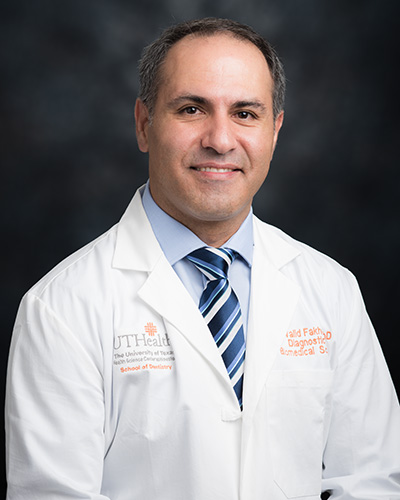
Dr. Walid Fakhouri is an associate professor in the Department of Diagnostic and Biomedical Sciences. He received a full-term fellowship from the German Academic Exchange Institute (DAAD) to earn his PhD in Phytomedicine and Molecular Biology from the University of Hohenheim, Stuttgart. Thereafter, he moved to the Michigan State University for his postdoctoral training in Biochemistry and Molecular Biology in Dr. David Arnosti’s lab, and a second postdoc in Human Molecular Genetics in Dr. Brian Schutte’s lab at the Department of Microbiology and Molecular Genetics. Dr. Fakhouri is a member of Sigma Xi Scientific Research, the American Society of Human Genetics and American Association of Dental Research. He is a recipient of several honors and awards for his scholarly activities, including the Dean’s Excellence Award in Application, Dean’s Excellence Award in Research, American Association of Anatomists (AAA) 2019-Early-Career Anatomist Publication Award, and the Rolanette and Berdon Lawrence Bone Disease Program of Texas. He has published over 43 peer-reviewed articles in high-impact factor journals.
Dr. Walid Fakhouri is an active investigator with NIH and state funding. In addition to his appointment at the School of Dentistry, he is on the faculty of The University of Texas MD Anderson Cancer Center UTHealth Graduate School of Biomedical Sciences (GSBS) and the Department of Pediatrics at McGovern Medical School. Dr. Fakhouri’s research investigates the regulation of craniofacial development by genetic and epigenetic factors, and how genetic mutations lead to craniofacial birth defects such as cleft lip and palate, craniosynostosis and facial dysostosis. Fakhouri’s lab has identified a novel interaction between two transcription factors involved in neural tube and orofacial development and maturation. The lab uses mouse models, organ cultures and biochemical assays to delineate the underlying mechanism of a gene function and regulation during craniofacial tissue development that are derived from cranial neural crest cells. His lab also integrates experimental data and bioinformatic analysis for developing computational models to identify causative non-coding DNA variations in oral carcinoma. Dr. Fakhouri’s research aims to uncover druggable genes and pathways that can be used to prevent and treat congenital birth defects.
Selected Publications:
1. April Zhang, Hira Aslam, Neha Sharma, Aryeh Warmflash, Walid D. Fakhouri. Conservation of epithelial-to-mesenchymal transition in neural crest cell and metastatic cancer. Cells Tissues Organs, 2021, Doi: 10.1159/000516466
2. Shawn Adibi, Davor Seferovic, Gena D. Tribble, Joseph L Alcorn, Walid F. Fakhouri. Surfactant protein A and microbiome composition in mucositis patients. Frontiers in Oral Health, 2021, 2:1-17.
3. Walid D Fakhouri, Jessica Wildgrube Bertol, Victoria K Xie, Shelby Johnston, Kelsea Hubka, Rachel Keuls, Ronald J Parchem, Mary C Farach-Carson. Regulation of cranial neural crest cell fate by Irf6 and Twist1 interaction. FASEB Journal, 2020, 34, 1-2.
4. Chelsea Wehr, Gianncarlo Cruz, Simon Young, Walid D. Fakhouri. An insight into Acute Pericoronitis and the need for an Evidence-Based Standard of Care. Dentistry J, 2019, 7(3), 88.
5. Walid D. Fakhouri, Ariadne Letra. Identification of disease risk DNA variations is shaping the future of precision health. Genes (Basel), 2019, 13(6), 450.
6. Jake Thompson, Fabian Mendoza, Ethan Tan, Arju S Gaggar, Claudia Biguetti, Walid D. Fakhouri. A cleft lip and palate gene, IRF6, is involved in bone mineralization. Dyn. 2019, 248(3): 221-232.
7. Srishti Manocha, Nadia Farokhnia, Sepideh Khosropanah, Jessica W. Bertol, Joel Santiago Junior, Walid D. Fakhouri. A systematic review of hormonal and genetic factors involved in the development and nonsyndromic disorders of the lower jaw. Dyn., 2019, 248(2): 162-172.
8. Vitor Onuchic, Eugene Lurie, Ivenise Carrero, Piotr Pawliczek, Ronak Y. Patel, Joel Rozowsky, Timur Galeev, Zhuoyi Huang, Robert C. Altshuler, Zhizhuo Zhang, R. Alan Harris, Cristian Coarfa, Lillian Ashmore, Andrew R. Jackson, Jessica W. Bertol, Walid D. Fakhouri, Fuli Yu, Manolis Kellis, Mark Gerstein, Aleksandar Milosavljevic, on behalf of the NIH Roadmap Epigenomics project. High-resolution allele-specific epigenomic maps reveal sequence-dependent stochastic switching at gene regulatory loci. Science, 2018, DOI:10.1126/science.aar3146.
9. Joel Ferreira Santiago Junior, Claudia Cristina Biguetti, Mariza Akemi Matsumoto Guilherme Abu Halawa Kudo, Raquel Barroso Parra da Silva, Patrícia Pinto Saraiva, Walid D. Fakhouri. Can Genetic Factors Compromise the Success of Dental Implants? A Systematic Review and Meta-Analysis. Genes, 2018, 9, 444, doi:10.3390.
10. Kareem A. Metwalli, Megan A. Do, Kara Nguyen, Sathi Mallick, Katherine Kin, Nadia Farokhnia, Goo Jun, Walid D Fakhouri. Interferon Regulatory Factor 6 is necessary for salivary gland and pancreas development, J Dent Res 2018, 97 (2), 226-236.
11. Walid D Fakhouri$, Kareem Metwalli, Ali Naji, Sarah Bakheit, Angela Quispe-Salcedo, Larissa Nitschke, Youssef A Kousa, Brain C Schutte. Intercellular genetic interaction between Irf6 and Twist1 during craniofacial development. Scientific Reports, 2017, DOI:10.1038/s41598-017-06310. ($ = corresponding author)
12. Katherine Kin, Xi Chen, Manuel Gonzalez-Garay, Walid D Fakhouri. The effect of non-coding DNA variations on P53 and cMYC competitive inhibition at cis-overlapping motif. Hum Mol Genet, 2016, 25(8): 1517-27.
F1000Prime Recommendations*
* = A recommendation written by F1000 Faculty Dr. Evans to indicate the significance of this article in its field. Evans K and Ryan N: F1000Prime Recommendation of Evaluation [Kin K et al., Hum Mol Genet 2016, 25(8): 1517-27], 15 Apr 2016; DOI: 10.3410/f.726172772.
13. Choi K, Haddad Y, Fakhouri WD. Analysis of the relationship between micrognathia and cleft palate: a systematic review. Cleft Palate-Craniofacial Journal. 2015; 52(5):1-11.
14. Nishtha Joshi, Ahmad Hamdan, Walid D Fakhouri. Skeletal malocclusion; a developmental disorder with a life-long morbidity. J Clinical Medicine Research. 2014; 6(6): 399-408. PubMed PMID: 25247012.
Education
Postdoc, Microbiology and Molecular Genetics | Michigan State University
PhD, Phytopathology and Molecular Biology | University of Hohenheim, Stuttgart, Germany
MSc, Phytopathology/Bacteriology | University of Jordan, Amman, Jordan